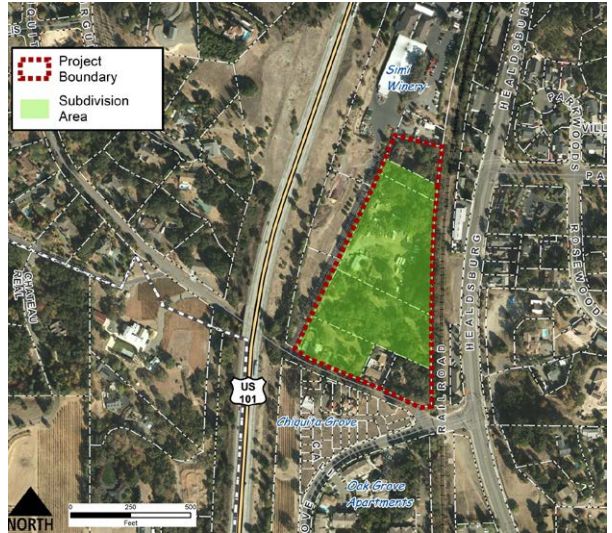
Council also considers affordable housing eligibility
Healdsburg City Council members voted 5 to 0 Monday evening, passing the inclusionary housing agreement for the Oaks at Foss Creek housing development, creating a requirement for the developers to set aside 15 percent of the project’s units for low-to-moderate-income housing. The local preference policy for affordable housing establishing a priority for those eligible for affordable housing projects was tabled for further discussion at a future city council meeting.
Council members unanimously supported the inclusionary housing agreement for the Oaks at Foss Creek with Healdsburg Mayor Brigette Mansell saying it was a good step forward.
“Thank you for being here and helping us move forward (with this),” Mansell said.
For the Oaks at Foss Creek, a proposed three-to-four-bedroom unit housing project near Foss Creek and Chiquita Road, the agreement means around four detached single-family affordable units will slated for various levels of affordable housing.
Ten percent of the units will be reserved for households with low-income earners and five percent will go towards median to moderate-income households.
In an affluent, tourist attraction community such as Healdsburg, what earning figures are considered low to moderate income?
According to the state of California, households considered to be very low income earn, “50 percent or less of area median income,” with low-income households defined as earning 50 to 80 percent below area median income. Moderate-income households are typically defined as 80 to 120 percent below the median income.
The median income for Sonoma County is currently at $84,100 per year, meaning 50 percent less, or $42,050, would be considered very low, $67,280 low and around $75,690 to be moderate. In this case, two units will go towards low-income families, one will go towards a median-income family and one will go towards a moderate-income family.
One of the unit plans will also be overseen by the Housing Land Trust Sonoma County, which helps low-income families find housing through their special land trust program.
“Many cities have inclusionary housing ordinances, mostly for residential development and they are a way to require participation of private developers in the provision of affordable housing. So this is one of the ways the City of Healdsburg achieves some of its affordable housing goals,” said Lisa Kranz, Healdsburg’s senior planner.
No public comments were heard on the matter and there were no opposing views voiced about the agreement.
At a future city council meeting, council members and city staff will consider the final layout for the plan map. The project will span 7.8 acres of a former industrial use site adjacent to Foss Creek at Chiquita Road and is being headed by DRG Builders, Inc.
Affordable housing local preference policy
In addition to inclusionary housing, council members brought the topic of local preference policy to the dais, but did not provide a final vote on the matter as several council members voiced they also wanted to give preference to former Healdsburg residents.
In layman’s terms, a preference policy sets guidelines for who would be first, second and third in line for affordable housing projects in Healdsburg.
While there have been various policies over the years on who gets first priority, the city has typically granted preference to affordable housing applicants who live and work in Healdsburg. According to city staff, past projects that used this policy include Chiquita Grove, 1201 Grove Street and the Sorrento housing projects.
This new set of preference priority guidelines would be used for future affordable housing projects in town.
According to city staff, the proposed priority levels for housing applicants would go towards those within Healdsburg city limits, then towards those in unincorporated Healdsburg within the 95448 zip code and lastly towards Windsor, Geyserville and Cloverdale residents.
However, many city council members voiced that these priority guidelines were too constraining.
“I’d like to see something inserted before the third priority for people who have lived in Healdsburg at some point… and part of the reason for the affordable housing and the local preference is to re-stitch the fabric of the community,” said Vice Mayor David Hagele, mentioning that there are some families who have been priced out of the community for 10 years.
Healdsburg resident, Brian Sommer echoed similar thoughts, saying priority should also be given for those who attend Healdsburg schools and for working families.
Since council members were torn on the proposed preference priority that city staff created, the item will come back to city council in the form of a new, re-written proposal.
Editor’s Note: This article was originally posted on Nov. 7.







